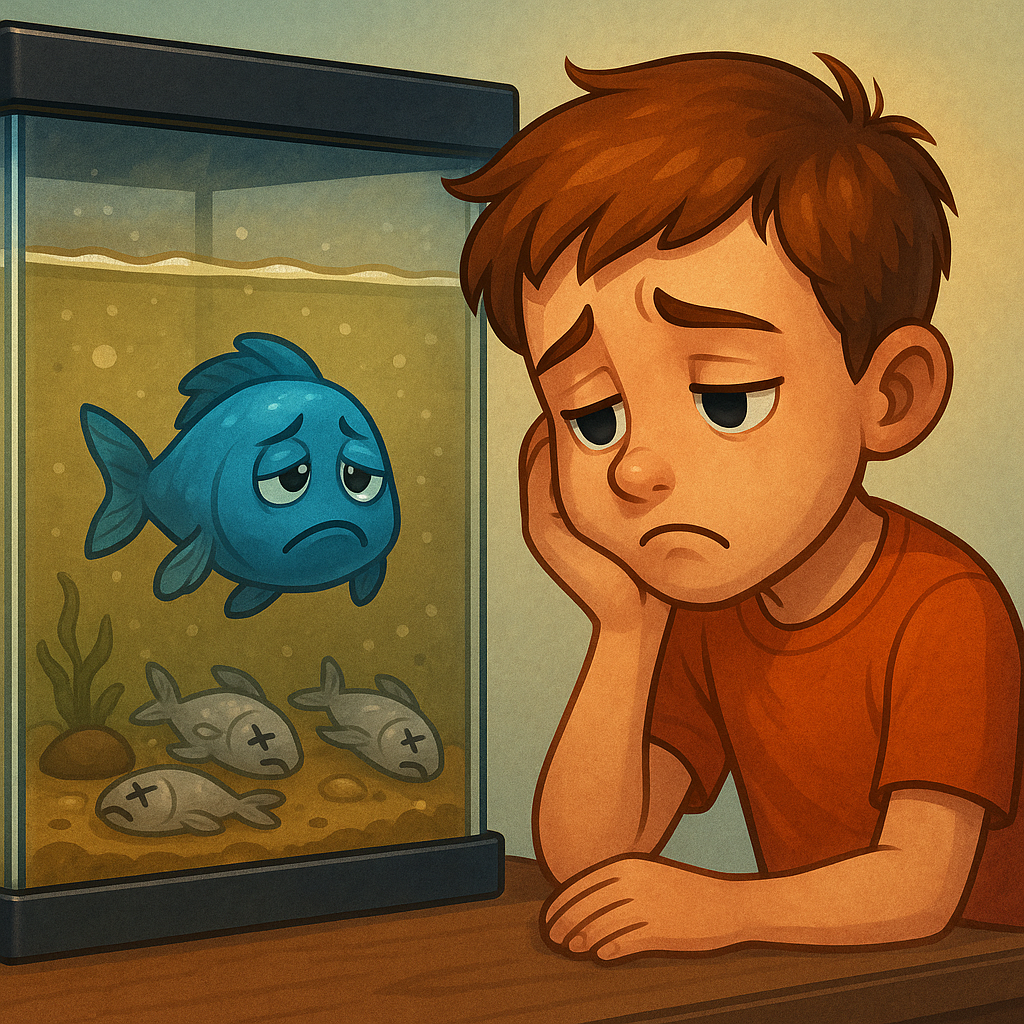Fish Are Dying: Advanced Emergency Playbook
🚑 Fish Are Dying: Advanced Emergency Playbook
⏱️ First 10 Minutes — Stabilize
- 💨 Max oxygen now
- Crank air and aim returns at the surface for ripples.
- Lower water level slightly so HOB filters “waterfall.”
- Turn off CO₂ (planted tanks).
- No airstone? Point a powerhead at the surface; even scooping and pouring water from height helps in a pinch.
- 💧 Detox immediately
- Dose a conditioner that handles chlorine/chloramine and binds ammonia/nitrite (per label).
- Stop feeding 24–48 hrs (waste reduction = oxygen back to your fish + lower ammonia production).
- 🧪 Fast tests
- NH₃/NH₄⁺, NO₂⁻, NO₃⁻, pH, KH, Temp.
- Remove corpses and rotting organics right away.
🕐 Next 60 Minutes — Correct Course
- 🚿 Emergency water change
- 40–50%, temp-matched, fully dechlorinated.
- If NH₃ or NO₂⁻ still > 0, do 25–30% again in 12–24 hrs until 0/0.
- 🔌 Hardware triage
- Heater reading vs thermometer? (over/underheat kills fast)
- Filter flowing? Impeller spinning? Prefilter clogged?
- Canister: check O-rings/hoses for air leaks (microbubbles reduce pump efficiency).
- Recent power outage? Treat it like a filter crash (see below).
- 🧴 Suspect toxin?
- Run fresh activated carbon / Poly-Filter (paint, aerosol, cleaners, smoke, pesticides, metals).
- Keep heavy aeration while running chemical media.
- 🧱 pH/KH crash (Old Tank Syndrome) signs
- Very low pH, lethargy/gasping, high NO₃⁻, KH near zero.
- Fix gradually: 15–20% water changes every 6–12 hrs + re-buffer KH in small steps. Avoid a big one-time jump.
🧭 Root-Cause Fast Map
- 💥 Ammonia/Nitrite detected → New tank, filter crash, overcleaned media, overfeeding, hidden dead fish.
- 🌡️ Temperature off → Heater failure, room heat spike, cold top-off.
- ⚖️ pH/KH crash → Long intervals between changes + high nitrate.
- 🧴 Toxins → Household sprays, soap residue on hands, off-gassing décor, metals.
- 🪵 New substrate/wood/rocks → Leaching or dust; remove suspect item and polish water.
🔬 Deep Diagnostics & What to Do
🧫 If NH₃ / NO₂⁻ > 0
- Water changes as above + extra aeration (detox products don’t add oxygen).
- Don’t clean bio-media right now; you need those bacteria.
- After stable: add bottled nitrifiers to bolster the biofilter.
⚖️ If pH/KH crashed
- Raise KH slowly (crushed coral, baking-soda-based buffers per label).
- Multiple small water changes; recheck pH between rounds.
🌡️ If temp shock
- Adjust ≤2°F (1°C) per hour toward target.
- Add aeration—warm water holds less O₂.
🧴 If chemical poisoning suspected
- Massive water change, carbon/Poly-Filter, continuous aeration.
- Remove the source; open room ventilation.
- Metallic contamination? Poly-Filter color change can hint at the culprit.
🧰 After antibiotics or a power outage
- Expect a biofilter setback. Feed sparingly, test daily, and reseed with nitrifiers.
💊 When & How to Medicate (safely)
Fix water first. Stressed, hypoxic fish don’t tolerate meds well.
- ❄️ Ich → Heat (if species tolerate) + ich med per label.
- 🦠 Bacterial signs (fin rot, ulcers, red streaks) → broad-spectrum antibiotic.
- 🍄 True fungus → methylene blue/antifungal; salt only if species tolerate.
- 🪱 Flukes/parasites (flashing, excess slime) → praziquantel/metronidazole.
- 🧩 Look-alikes matter: White spots may be Epistylis (needs antibiotics, not ich meds).
Treatment rules: - Remove carbon/chem media, turn UV off during medication.
- Dose to label, maintain O₂, and finish the course.
- Quarantine if multiple meds are needed or species are sensitive (loaches, Corys, plecos, shrimp).
🍽️ Supportive Care (speeds recovery)
- 🌑 Dim lights; minimize traffic near tank.
- 🍲 Resume tiny, high-quality feedings only when fish are responsive (vitamin-soaked frozen is great).
- 💨 Keep strong aeration through recovery.
- 🧪 Test daily for a week; log values.
🧰 “Aquarium First-Aid Kit” (keep stocked)
- 🧴 Conditioner that binds ammonia/nitrite + dechlorinates.
- 💨 Spare air pump/airstone (battery backup if you can).
- 🧪 Liquid test kit; KH/GH strips for quick checks.
- 💊 Core meds: ich remedy, broad antibiotic, praziquantel/metronidazole, methylene blue, aquarium salt (know which fish are salt-sensitive).
- 🧊 Activated carbon/Poly-Filter for toxins.
- 🪣 QT tank, cycled sponge filter (seed in main tank), spare heater, nets/buckets dedicated to QT.
📅 72-Hour Recovery Plan (template)
- Day 1: Emergency WC 40–50%, binders, max aeration; remove corpses/decay; test 2×/day.
- Day 2: If NH₃/NO₂⁻ > 0 → 25–30% WC; begin targeted meds only if symptoms persist and O₂ is good.
- Day 3: Reassess appetite/respiration; continue WCs until 0/0; keep lights low; re-seed bacteria if filter was compromised.
Improving: calmer breathing, schooling normally, interest in food.
Worsening: surface gasping despite O₂, rolling, hemorrhagic streaks—bigger WC, more O₂, reassess toxin/temperature/pH.
🔒 Biosecurity (stop the cascade)
- 🪣 Separate tools for QT vs display.
- 🧼 Rinse hands/arms with water only before/after.
- 📦 Quarantine all new fish 2–4 weeks.
- 🧽 Clean prefilters weekly; don’t deep-clean all media at once.
🧮 Nitrate-Based WC Planning (why schedule matters)
- Find weekly nitrate gain (ΔNO₃).
- If Δ ≈ 20 ppm/week:
- 50% weekly keeps swing ~20→40 ppm (acceptable for most).
- 25% weekly allows buildup ~45–60+ ppm (stress).
- Adjust % and frequency to hold your target (<20–30 ppm; <10 ppm for delicate species).
🧩 Common Killer Timelines (helps pinpoint cause)
- Minutes–hours: toxins, heater stuck on, massive pH/temperature shock, O₂ crash (CO₂ mishap).
- Hours–day: ammonia/nitrite spike, severe aggression, overstocking with weak aeration.
- Days–weeks: chronic nitrate, parasites/bacteria, starvation after overstock stress.
✅ After Stabilization — Hardening the System
- 📏 Right-size filtration (4–8× turnover; prefilter sponges).
- 📅 Consistent WC cadence (based on your ΔNO₃, not guesswork).
- 🍽️ Slight underfeeding beats overfeeding; remove leftovers.
- 🧪 Weekly testing until trends are boring (that’s good!).
- 🧱 Add redundancy: spare heater, spare air pump, battery backup if outages happen.

Impulsada por Lightspeed
Mostrar precios en:USD